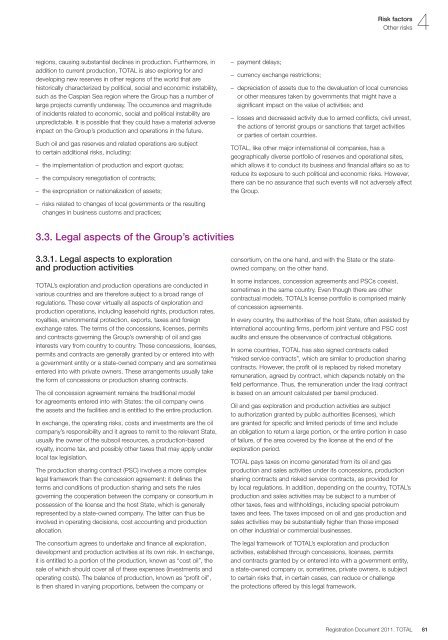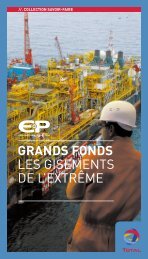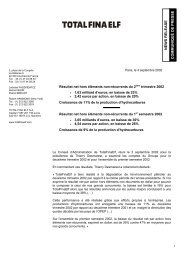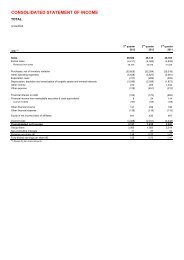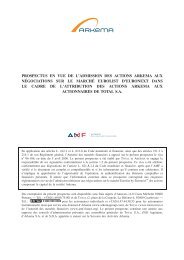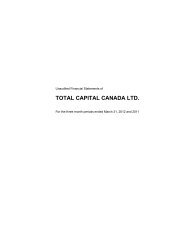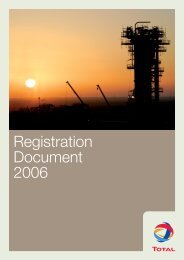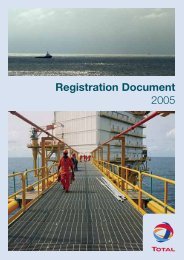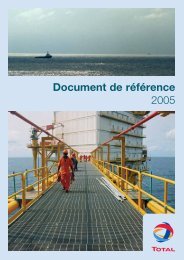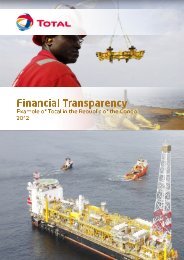Registration document 2011 - tota - Total.com
Registration document 2011 - tota - Total.com
Registration document 2011 - tota - Total.com
Create successful ePaper yourself
Turn your PDF publications into a flip-book with our unique Google optimized e-Paper software.
egions, causing substantial declines in production. Furthermore, in<br />
addition to current production, TOTAL is also exploring for and<br />
developing new reserves in other regions of the world that are<br />
historically characterized by political, social and economic instability,<br />
such as the Caspian Sea region where the Group has a number of<br />
large projects currently underway. The occurrence and magnitude<br />
of incidents related to economic, social and political instability are<br />
unpredictable. It is possible that they could have a material adverse<br />
impact on the Group’s production and operations in the future.<br />
Such oil and gas reserves and related operations are subject<br />
to certain additional risks, including:<br />
– the implementation of production and export quotas;<br />
– the <strong>com</strong>pulsory renegotiation of contracts;<br />
– the expropriation or nationalization of assets;<br />
– risks related to changes of local governments or the resulting<br />
changes in business customs and practices;<br />
3.3. Legal aspects of the Group’s activities<br />
3.3.1. Legal aspects to exploration<br />
and production activities<br />
TOTAL’s exploration and production operations are conducted in<br />
various countries and are therefore subject to a broad range of<br />
regulations. These cover virtually all aspects of exploration and<br />
production operations, including leasehold rights, production rates,<br />
royalties, environmental protection, exports, taxes and foreign<br />
exchange rates. The terms of the concessions, licenses, permits<br />
and contracts governing the Group’s ownership of oil and gas<br />
interests vary from country to country. These concessions, licenses,<br />
permits and contracts are generally granted by or entered into with<br />
a government entity or a state-owned <strong>com</strong>pany and are sometimes<br />
entered into with private owners. These arrangements usually take<br />
the form of concessions or production sharing contracts.<br />
The oil concession agreement remains the traditional model<br />
for agreements entered into with States: the oil <strong>com</strong>pany owns<br />
the assets and the facilities and is entitled to the entire production.<br />
In exchange, the operating risks, costs and investments are the oil<br />
<strong>com</strong>pany’s responsibility and it agrees to remit to the relevant State,<br />
usually the owner of the subsoil resources, a production-based<br />
royalty, in<strong>com</strong>e tax, and possibly other taxes that may apply under<br />
local tax legislation.<br />
The production sharing contract (PSC) involves a more <strong>com</strong>plex<br />
legal framework than the concession agreement: it defines the<br />
terms and conditions of production sharing and sets the rules<br />
governing the cooperation between the <strong>com</strong>pany or consortium in<br />
possession of the license and the host State, which is generally<br />
represented by a state-owned <strong>com</strong>pany. The latter can thus be<br />
involved in operating decisions, cost accounting and production<br />
allocation.<br />
The consortium agrees to undertake and finance all exploration,<br />
development and production activities at its own risk. In exchange,<br />
it is entitled to a portion of the production, known as “cost oil”, the<br />
sale of which should cover all of these expenses (investments and<br />
operating costs). The balance of production, known as “profit oil”,<br />
is then shared in varying proportions, between the <strong>com</strong>pany or<br />
– payment delays;<br />
– currency exchange restrictions;<br />
consortium, on the one hand, and with the State or the stateowned<br />
<strong>com</strong>pany, on the other hand.<br />
Risk factors<br />
Other risks 4<br />
– depreciation of assets due to the devaluation of local currencies<br />
or other measures taken by governments that might have a<br />
significant impact on the value of activities; and<br />
– losses and decreased activity due to armed conflicts, civil unrest,<br />
the actions of terrorist groups or sanctions that target activities<br />
or parties of certain countries.<br />
TOTAL, like other major international oil <strong>com</strong>panies, has a<br />
geographically diverse portfolio of reserves and operational sites,<br />
which allows it to conduct its business and financial affairs so as to<br />
reduce its exposure to such political and economic risks. However,<br />
there can be no assurance that such events will not adversely affect<br />
the Group.<br />
In some instances, concession agreements and PSCs coexist,<br />
sometimes in the same country. Even though there are other<br />
contractual models, TOTAL’s license portfolio is <strong>com</strong>prised mainly<br />
of concession agreements.<br />
In every country, the authorities of the host State, often assisted by<br />
international accounting firms, perform joint venture and PSC cost<br />
audits and ensure the observance of contractual obligations.<br />
In some countries, TOTAL has also signed contracts called<br />
“risked service contracts”, which are similar to production sharing<br />
contracts. However, the profit oil is replaced by risked monetary<br />
remuneration, agreed by contract, which depends notably on the<br />
field performance. Thus, the remuneration under the Iraqi contract<br />
is based on an amount calculated per barrel produced.<br />
Oil and gas exploration and production activities are subject<br />
to authorization granted by public authorities (licenses), which<br />
are granted for specific and limited periods of time and include<br />
an obligation to return a large portion, or the entire portion in case<br />
of failure, of the area covered by the license at the end of the<br />
exploration period.<br />
TOTAL pays taxes on in<strong>com</strong>e generated from its oil and gas<br />
production and sales activities under its concessions, production<br />
sharing contracts and risked service contracts, as provided for<br />
by local regulations. In addition, depending on the country, TOTAL’s<br />
production and sales activities may be subject to a number of<br />
other taxes, fees and withholdings, including special petroleum<br />
taxes and fees. The taxes imposed on oil and gas production and<br />
sales activities may be substantially higher than those imposed<br />
on other industrial or <strong>com</strong>mercial businesses.<br />
The legal framework of TOTAL’s exploration and production<br />
activities, established through concessions, licenses, permits<br />
and contracts granted by or entered into with a government entity,<br />
a state-owned <strong>com</strong>pany or, sometimes, private owners, is subject<br />
to certain risks that, in certain cases, can reduce or challenge<br />
the protections offered by this legal framework.<br />
<strong>Registration</strong> Document <strong>2011</strong>. TOTAL 81


